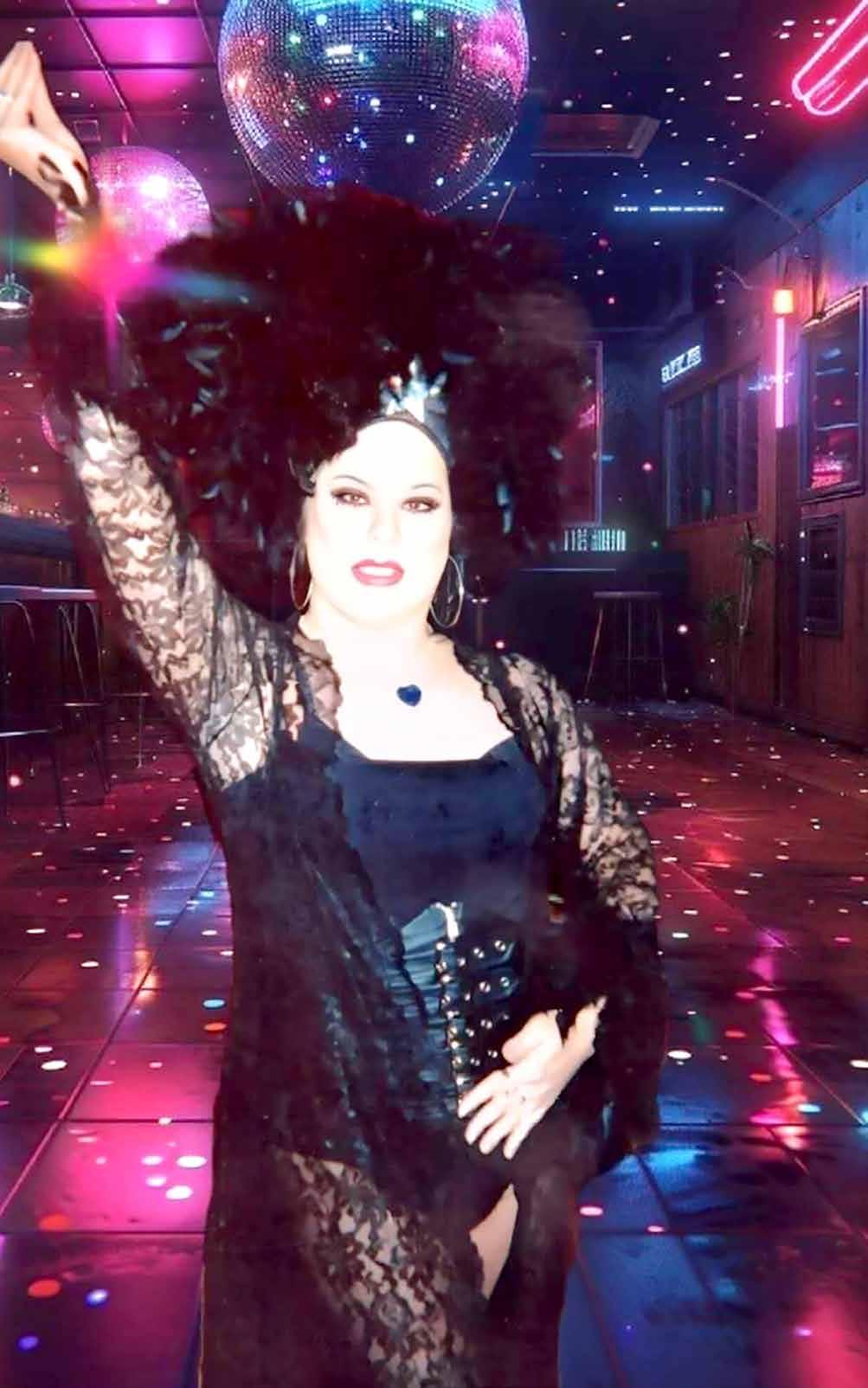

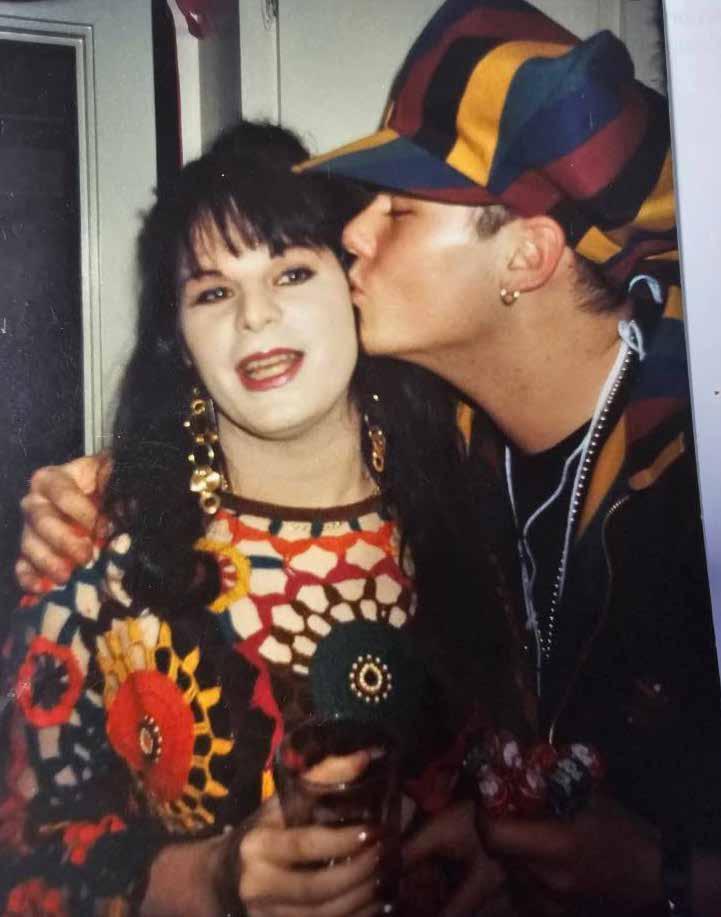




Capitol Hill is no stranger to a party. In fact, few can dispute the pivotal role it has played as the epicenter of all things Queer, colorful, and fabulous in Seattle. And sitting in the midst of the district’s long story is Neighbours Nightclub, a space steeped in history, glitz and glamour, vogue and drama, and, of course, many dollar bills.
Its reigning queen was Miss Roxy Doll, a rock star at heart who epitomized the grungy, gritty, and gothic worlds of drag. She led the iconic “Dollhouse,” a beloved weekly variety and talent showcase hosted at Capitol Lounge and later at Neighbours.
But on June 24, she passed away. Roxy reportedly “fell ill … lay down to rest [and] was later found unresponsive.” Jimmy Cafarella, younger brother to Roxy, later told the SGN that the medical examiner determined the official cause of death as hypertensive atherosclerotic cardiovascular disease.
“She was special in Seattle, because, in my opinion, she was the first rock-androll drag queen,” said longtime friend Babyteeth. “And most drag queens back then were commercial, disco, you know.”
On July 11, the community gathered to celebrate her life, luxury, and lasting legacy. The event, “Dollhouse of Delights,” was a trip that ran all night, filled with comedy, drag, and heartfelt tributes. Most of all, it was an outpouring of love and inclusivity from the community. It was a reminder that, even in tough times, we can come together to honor the bold, the beautiful, and the brave.
The queen of Neighbours Roxy’s story is woven deep into the fabric of Seattle’s Queer history. Boy Mike, a longtime friend and fierce queen in his own right, had known Roxy since they were 14. He shared with the SGN what those early days were like for the partners in crime:
“We would crash at people’s apartments, get supplies at the Orion Center,” he said. “We were street kids together. We were made to help each other.”
Before modern-day conceptions of gender, young Boy Mike and Roxy blurred the lines with their Queer styles of self-expression. “Roxy and I, we were doing drag before we even knew what it was. They
BY NOVA BERGER AND MADISON JONES
couldn’t tell us fish from fowl,” he proudly stated.
Quickly, the pair went on to develop a reputation in Seattle’s Gay scene. “Everyone knew who we were,” Boy Mike added. “We went to City Beat, then Club Broadway. When we were 21, we finally made it to Neighbours.”
It was from there that the two finally realized they could make a living doing drag, he said.
Roxy had a scrappy, unstoppable way of making it work — she took on every opportunity to grow and experience, regardless of the circumstances.
“We were both telemarketers. All the street kids worked there — we could be freaky and work,” admitted Boy Mike.
“Then Roxy worked the coat check at Brass Connection. After Neighbours, she worked her way up. We survived together. Clawed our way to the top. I’m really proud of her.”
But Roxy didn’t just perform at Neighbours and become the general manager —
she rescued it. In 2020, after pandemic closures and vandalism left the venue broken and abandoned, Roxy led its revival. She cleaned up the wreckage, organized talent, and revived its legendary stage.
And ever since she made her mark, she hasn’t stopped letting others make theirs.
Drag daughters, chosen family
For some, Roxy gave them their first chance at twinkling stardom.
“I’m the first AFAB performer to host a weekly show at Neighbours,” said Delulu Lemon, who opened Thursday’s show. A drag daughter of Roxy, Delulu has vowed to carry on her legacy.
For others, Roxy was a literal lifeline.
“I’ve known her since I was 17. She helped save my life — got me off the streets, off drugs,” said Ryan Hazy, a singer from Las Vegas who came up for the show. “She gave me a place to perform and express myself.
Roxy is what Pride was about. Everybody matters — doesn’t matter if you’re Black,
white, purple, orange, or green.”
Roxy’s “Dollhouse” didn’t just entertain, it saved lives and built families. In a city that can feel cold and standoffish, Roxy made it easy to feel at home. She gave people voice, sparkle, and courage — to stand tall, strut proudly, and shake that thang.
Roxy’s partner
Evan Evans was Roxy’s romantic partner of seven years. Giving insight into their relationship, he described how Roxy was an avid collector of dolls and a lover of cats. Touching on her fiery personality, he laughed and said that if Roxy was symbolic of anything it was “be Gay, do crime!”
And in a world where being your authentic self is no longer recognized legally, Roxy was a fierce self-advocate as a Transgender woman, stated Evans. Roxy fought hard to have her documentation changed here in Washington state to reflect her identity.
Evans also described how they cherished


spending time together traveling, listing Hawaii and Disneyland among places they had visited.
“Our next destination was supposed to be New Orleans,” he said with a sigh.
Evans’s sister Nickole Evans contacted the SGN and shared family photos. She said of Roxy: “She was an incredible auntie to my littles and sister-in-law. We love and miss her tremendously.”
The show
The evening’s spectacular opened with Roxy’s legacy herself: the lovely Madam Delulu Lemon, a Seattle-based drag performer known for blending theatrical flair with high-energy, campy drag. A graduate of Cornish College of the Arts, she brings deep stage experience to her performances, having taken on roles in productions like Orpheus Descending and Swan Lake: Remix, and having worked with companies such as Seattle Rep and Book-It Repertory Theatre. For over a decade, she co-hosted “Dollhouse” at Neighbours, establishing herself as a key figure in the local drag scene. With a name that cheekily nods to internet slang and athleisure culture, she embodies the Capitol Hill witty persona that mixes classic theater training with modern Queer expression.
Her tear-jerking opening speech had the crowd on their feet before the first number. “I feel like we’re all her children to a degree — everybody in Capitol Hill, everybody in Seattle, all beautiful Queer people,” said Delulu.
The first act needed no words. Sherry Juarez, a longtime Neighbours employee and one of Roxy’s closest friends, danced in front of Roxy’s iconic boots. By the end of the song, they were overflowing with cash.
The rest of the night was filled with Seattle’s most wacky and wonderful talent: drag from all walks of life, from hair-raising ballads to vivacious twerking. Some were costumed, others not.
Featured performers included Sherry Juarez, reprising Roxy’s
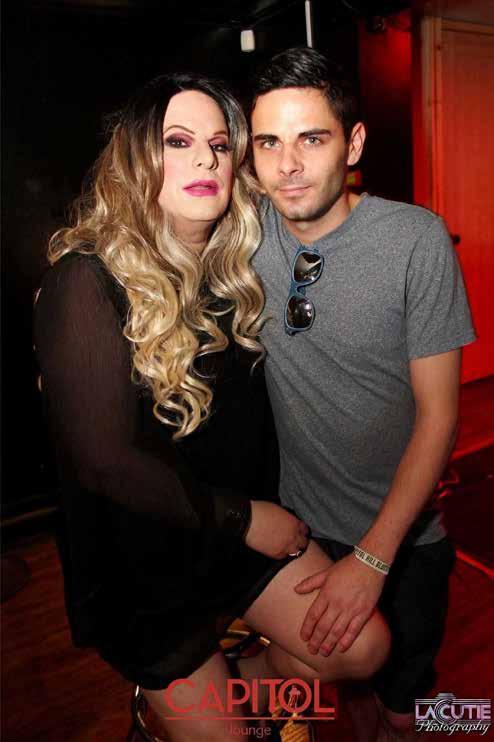
with an original song; and Captain Dr. GQ Esquire, a drag king who performed an original poem. The show went long into the night, with room for an encore.
At the end of the day, Roxy’s legacy lives on at Neighbours. She reminds us to embrace our wacky and wonderful, our weird and wild, and to let our freak flags fly. For every little boy and girl who wanted to dance but was told they had two left feet, for every soprano who dropped to an alto and quit band but still longed for a stage, for every mad, sad, or broken soul who just needed to be seen — Roxy gave them space to shine.
So here’s a shout, a twirl, and a holler for Roxy Doll — who never gave up and never gave in.
The SGN will host, in coordination with the family, a memorial service for the community in Roxy’s honor on August 23rd from 2pm to 5pm. The event will be held in the same building as the SGN office, All Pilgrims Church at 500 Broadway E. on Capitol Hill, Seattle.


Rest in power, Roxy! I still remember meeting you at Club Broadway in 1988 dancing to Knock on Wood. Your light will always shine. Energy never dies, and neither will your status as a Seattle legend. — Will Becker
I was awakened to learn this sad news! My heart is aching! Roxy Doll was a SEATTLE ICON AND LEGEND! She did so much for the drag community and for performers. She gave people a place to call home and a stage to share their talents when no one else in Seattle would. She took me in off the streets to help me with my drug addictions when I was 17. She was a remarkable woman! I will never forget her UNENDING LOVE AND CARE FOR OTHERS! … She DESERVES TO REMEMBERED! She kept Neighbours Nightclub up and running after the pandemic and after all that devastation and destruction to the property. She was an inspiration to many in the LGBTQIA+ community. MAY SHE LIVE IN OUR HEARTS FOREVER!!! — Ryan Hazy
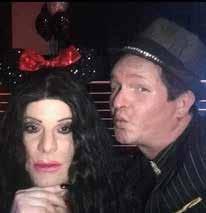
Roxy Doll always had space on the stage for any performer. I am lucky to have performed at the The Dollhouse so many times. Rest in power (and high heels) — Basheera
What an absolute icon. I met Roxy through the Fenix burlesque scene forever ago, and she was always so sweet to me. She spent her life building others up, and helping build the places that make Seattle shine. To all those who knew her, and were inspired by her, my love goes out to you. — James Teebes Kelso
Rest in paradise, Roxy, one of the first people I befriended at Neighbours when I go-go danced there 16 years ago. I always had to get my Roxy hug every time I saw her. When I first started, I told her how nervous I was to dance and [thought I was] going to mess up or look dumb, and she said, “Knock on wood! Own it baby and give them something to look at!” — Nico Valle
Such a huge loss. I’ve known her since the mid-’90s. Her talent was endless, and her love for our community was even more so. — Micah Reynolds
She worked so hard to get it reopened after COVID, when it seemed like others wanted to give up. — Eric Diaz-Rising
Oh so sad. RIP, Roxy. I loved seeing you perform. — Christina Fairchild
RIP Roxy — Alex McKay
Rest, Doll — Vaughn Bombeck
I am just in shock over this news. She and I met 40 years ago at the Brass Connection. I just talked to her not too long ago. She was always a big support to me. She is now at peace with all of the Seattle queens that passed away when we were young. She’s now reunited with her buddies Crystal Lane and Zora, who were two huge pillars of the LGBT community back in the early ’80s. Such a sad day for us all. Much love for Roxy always. Rest peacefully, Seattle icon! — Toni James
From an early age, Roxy loved to dance. She would have the music playing and dance in our living room, and sometimes the neighbors would join us. My mom was the assistant manager of our apartment, so no one complained about the loud music (also probably because it was daytime). She gave me and my siblings our love for ’80s music like Adam Ant, Blondie, Culture Club, etc. We will always have memories of the good times. She will not be forgotten May Roxy RIP — Bridget Cafarella
A very sad day indeed. A true icon to the LGBT community. I am devastated to hear the news about her passing. May she rest in peace. She will be missed, I hope her legacy continues. She was a wonderful person and friend to me. — Sahara Dior D
Aww rest in love, Roxy Doll!!! — Letrese Dozier
You were an amazing mentor to the community, Mama! You always helped me out whenever I wanted to do a performance and made me laugh every time I saw you. Such an amazing soul. We’re going to miss you so much. Rest in power, gorgeous — Jayne Ashton
So sorry to hear this news. Roxy had such a beautiful soul and [was] so much fun to be around. She will always be a shining star — Michelle Brain
She was a legend! I loved her. Rest in love, you beautiful soul — Teague O’Brien
RIP Roxy. We met at the Vogue on First in Belltown in 1995. We became fast friends and [she] used to come to my afterhours parties. I still treasure the Pamela Anderson dolls, cards, and collection you gave to me — James Hambly
This breaks my heart. I’ve known and been friends with Roxy since the mid-’80s. We met at the City Nightclub in Portland, Oregon. I have so many good memories from Portland and Seattle. We had periods where we weren’t in contact much, but we always reconnected as if no time passed. She was always loving, kind, and supportive. I will miss her very much! — Anne McCloud
Rest in power, Girl. I’ll miss your kindness! — Lauren Thompson
Such sad news. Roxy was the best. She was so fun to be around. I knew her from the Vogue, Brass Connection, and of course Neighbours. Rest in peace, Roxy — Lisa Watson
We were so close for years and years and years and [I] worked with her at the Vogue and many places. She was a true rock and roll drag queen. I am in shock and can’t believe this [and] can’t stop crying. We were just texting a few weeks ago. Big, big loss. [A] true Seattle icon. I loved her so much... — James Carbo
May our beloved sister rest in peace and power. Haus of Heyoka sends all our love and energy to her loved ones. I bet she’s giving the Creators a good show up there — Gotrix Heyoka
My first encounter with Roxy was at City Beat nightclub, and “Knock on Wood” came on, and she commanded that floor. Later we would become friends through Boy Mike, and we all briefly became roommates. She always kept it real. I’m saddened to hear this — still so young. Love ya, lady — Carrie Blackshaw
Some of my most memorable and fun performances I’ve done in the goth/industrial music scene were thanks to Roxy. RIP.
— Nick Frank
She’s always in my head, Mr. Patty Wax Manger. She gave me licenses to dance!
R.I.P. Roxie Doll — Eugene Raymond
What a beautiful soul. I will never forget her absolute kindness. I hope her journey is as bright and beautiful as she made this world. — Michelle Crow
She was a true legend, yet she also could be down to earth. All the time she spent getting Neighbours back together during COVID and all she had done before and after. We chatted a few times over the years, and she was always honest in what she had to say. I’m going to miss her, and there will be so many others who will miss her more. RIP, Roxy. You will be missed. — Grey Wolfe
I am so very sad and heartbroken to hear this news. Roxy was such a powerful force in Seattle and such a wonderful, wonderful person, a true gem of this great city... You will forever be missed. My most sincere condolences to Roxy’s [closest] people — Rob Butler
Godspeed, dear friend. You will always be the fire — Joe Laverage
I remember her from the Brass Connection. She was always so much fun and a hoot to be around. She will be dearly missed — Mike Lawrence
My heart is broken! Rest in peace, my sweet friend! Sending prayers to Evan! — Eric Shirey
So sad. Rest in peace and thank you for all your love and support — Scott Benson
Oh my god, this is horrible. She was always so nice to me when I used to go down to Neighbours. I enjoyed her sense of humor and her kindness. This is upsetting. She will be missed. — Scott Coburn
I met her in 1985 when she was just a tiny little princess. She [was] absolutely wonderful and feral and perfect. House of Blitzka forever. —
Dagmar S Peterson
She’ll be missed by many. I remember meeting her in the early 1980s at City Beat... Everyone was smitten with Roxy. Years later we would share a tiny apartment on Capitol Hill for a short time. Got to see her on one of my trips back to Seattle, and I’m glad I did. My deepest condolences to her partner, family, and all who love and knew her. Iconic. Forever beautiful. — Nan Whitaker
She shines brightly amongst the stars now. Rest in power, Roxy. — Heather Ann


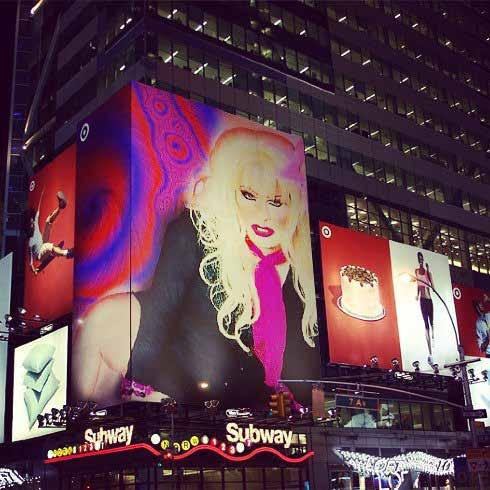
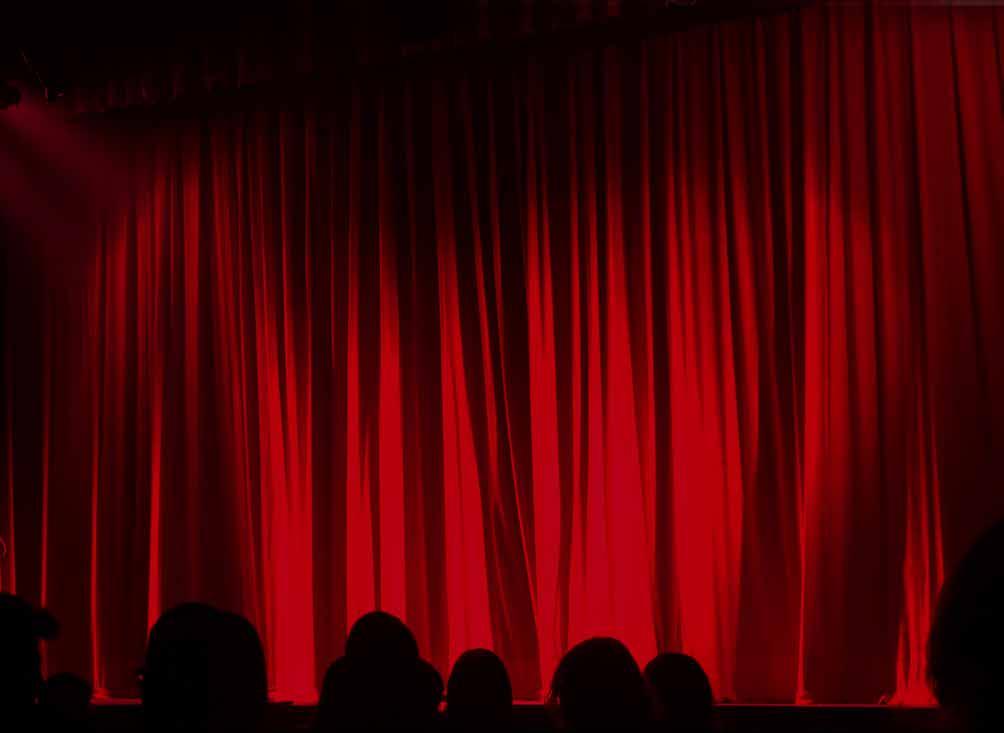
Join us as we celebrate the fierce, fabulous, and unforgettable life of Roxy Doll — a pillar of Seattle’s LGBTQIA+ community, beloved general manager of Neighbours Nightclub, and a true original. There will be music, drag performances, and heartfelt memories shared by family and friends. Let’s honor Roxy the way she lived — bold,glamorous,andfulloflove.
August 23rd | 2–5 PM All Pilgrims Church 500 Broadway E, Seattle (Enter on Republican St.)
All are welcome to pay tribute to our queen.


90th season puts the “festive” back in “festival”
BY ALICE BLOCH

Oregon Shakespeare Festival Ashland, Oregon
Through October 26
A couple of years ago, it looked as though the Oregon Shakespeare Festival (OSF) might not make it. The combination of COVID-19, wildfires, the withdrawal of a promised large donation, and the resignation of an embattled artistic director might well have been more than the venerable theater company could survive.
I’m happy to report that OSF has rebounded from that crisis. Under the leadership of current artistic director Tim Bond,
the 90th season is strong and well supported. Most of the seven performances I attended were sold out, and the productions are back to pre-pandemic levels of excellence.
The town of Ashland has also come back to life. For the first time in several years, I saw no boarded-up windows in the downtown shopping district. Restaurants and other businesses seemed to be thriving, and the expanded OSF gift shop was full of patrons.
A spirited No Kings Day protest brought out hundreds of residents and visitors, even though most had traveled to the larger pro-
test in Medford. The atmosphere was festive: in spite of the stress of current events, the people of Ashland still know how to celebrate.
Fittingly, two of the Shakespeare plays and all of the more modern plays now in repertory at OSF focus on the healing influence of friendship and community in difficult times.
Thomas Theatre through October 24
This beautiful, inventive production confirmed As You Like It as my favorite Shakespeare comedy. The main character,
Rosalind (played with winning enthusiasm by Nell Geisslinger), is a headstrong young woman who doesn’t mind cross-dressing when necessary. Her close friendship with her cousin Celia (Kat Peña, in a lovely performance) makes them more like sisters — or even partners. What’s not to like? Lisa Peterson’s expert direction keeps the action going at a pace that never flags. The comedy is set in two basic locations: the severe world of the Court and the funloving world of the Arden Forest, where banished nobles and their servants take refuge. Scenic designer Tanya Orellana and costume designer An-lin Dauber created


appropriately severe, monochromatic sets and costumes for the Court, and a brightly colored, 1960s-style environment for the forest enclave. The hippie costumes are absolutely fabulous — whoever did all that crocheting deserves a raise.
Those hippies love to play guitar and sing too. Composer and music director Paul James Prendergast did a great job of creating the sounds of 1960s folk rock, and choreographer Sunny Min-Sook Hitt helped the cast move with the music.
Cast members all performed admirably. David Anthony Lewis as the fool Touchstone, Sheila Tousey as the poet Jacques, Al Espinosa as the banished Duke Senior, Mark Murphey as the aged servant Adam, and Alexander Quiñones as Rosalind’s love Orlando gave particularly memorable performances. Amy Lizardo as the shepherd Phoebe proved to have an impressive singing voice as well as acting chops.
Into the Woods
Allen Elizabethan Theatre through October 11
Stephen Sondheim and James Lapine’s most renowned musical has by now become a familiar classic. In 2014, OSF mounted a splendid production, now revived with many of the same cast members.
To pull the audience into the fairy-tale world of the play, director and conductor Amanda Dehnert has the actors begin by wearing street clothes and mingling with the audience. Gradually they move to the stage and reappear in costume. The device works well.
The play begins and ends with characters saying “I wish.” In the first act, characters’ wishes are fulfilled, with the promise that all will live happily ever after. The second act turns dark, and by the end, the few survivors form a community to keep each other safe and connected. GLBTQ+ audience members, knowing that the play was written in the mid-1980s, can surely identify with the sudden, unpredictable losses of loved ones and the importance of community, expressed in the song “No One Is Alone.”
The cast and musicians did a superb job of navigating the complicated score. There wasn’t a weak link; all performed with confidence and skill.
Miriam A. Laube, her charisma intact after several years away from Ashland, is still the perfect Witch, the character who always tells the truth and gets to sing several of the best songs. Royer Bockus is terrific as her daughter Rapunzel. Other standout performers include Eddie Lopez as Cinderella’s Prince and the Wolf, Rhea Bradley as Little Red Riding Hood, Kjerstine Rose Anderson as the Baker’s Wife, Cedric Lamar as the Baker, Bebe Brown-

ing as Cinderella, Justin Huertas as Jack, and Kiki deLohr and Ellen Soraya Nikbakht as Cinderella’s evil stepsisters. These last two are simply a hoot.
If you are planning a visit to Ashland this year, don’t miss this spectacular production. It’s not likely to be repeated any time soon.
The Importance of Being Earnest Angus Bowmer Theatre through October 25
OSF gives Oscar Wilde’s last and most popular play a thoroughly enjoyable production. This delightful, witty drawing-
room comedy features some of the funniest lines ever written for theater and some of the funniest bits of physical comedy too. Although the play’s characters are not Gay, the humor certainly is.
Director Desdemona Chiang has set the play in 1895 British Malaya rather than in England. This unusual choice works well by emphasizing cultural and class differences. The sets designed by Se Hyun Oh and costumes designed by Melissa Torchia are gorgeous and period-perfect. The main character and Wilde stand-in,
CONTINUED PAGE 8
THE IMPORTANCE OF

Algernon Moncrieff, is a “dandy,” a seemingly straight man who dresses in fancy, flowing clothes and tosses witticisms about. Hao Feng has a field day with the role, arching his eyebrows and making fun of himself and everyone else.
Julian Remulla is excellent as Algernon’s humorless and therefore hilarious friend John Worthing. As Gwendolen Fairfax, John’s love interest, Kiki deLohr is fantastically pretentious. Long-time OSF regular Linda Alpert is excellent as Gwendolen’s snooty mother. Thilini Dissanayake plays Algernon’s love interest Cecily as a breath of fresh air, with admirable candor and an odd sense of humor. OSF veteran Rex Young makes the most of the tiny role of Lane, Algernon’s butler. He got some of the biggest laughs of the evening.
I found the scenes portraying the friendship between the two young men and the enemies-becoming-friends relationship between the two young women to be as satisfying as the scenes of courtship. Wilde clearly valued friendship at least as much as romantic love, and humor above all.
The Merry Wives of Windsor Allen Elizabethan Theatre through October 12
This production convinced me that even a good production can’t save a bad play. Yes, I’ve said it: Shakespeare wrote a bad play. The current OSF production is the best I’ve ever seen, but it’s still a bad play.
As we exited the theater, my companion said, “My favorite thing was the dog.” The dog was a puppet, with no lines. That said it all.
Director Terry McMahon gets credit for trying to liven up this not very funny comedy (hence the dog). Daniel T. Parker did a good job as Falstaff, and Amy Kim Waschke and Royer Bockus had great chemistry as the merry wives. The focus on their friendship almost saved the play.
Teri Brown as Widow Quickly showed off a marvelous singing voice, and Tim Getman as a Welsh parson made the Corgi puppet he carried around expressive and lovable.
Two items of interest to us Queers, in addition to the chemistry between the merry wives: the character of Fenton is Nonbinary, and Dr. Caius accepts a man as his spouse at the end of the play.
Julius Caesar
Angus Bowmer Theatre through October 26
It pains me to write that I was disappointed with this all-woman Julius Caesar, coproduced with Seattle’s Upstart Crow Collective and directed by Rosa Joshi. I wanted to love it but found it lackluster and unconvincing.
Kate Hurster, who has excelled in other OSF productions, seemed uncomfortable in the role of Brutus, the main character. Brutus is an introvert who overanalyzes, and Hurster didn’t seem to know how to convey that personality type.
Caro Zeller gave a strong performance as Cassius, as did Jessika D. Williams as Mark Antony. The always excellent Sheila Tousey did an amazing job in all three of her roles.
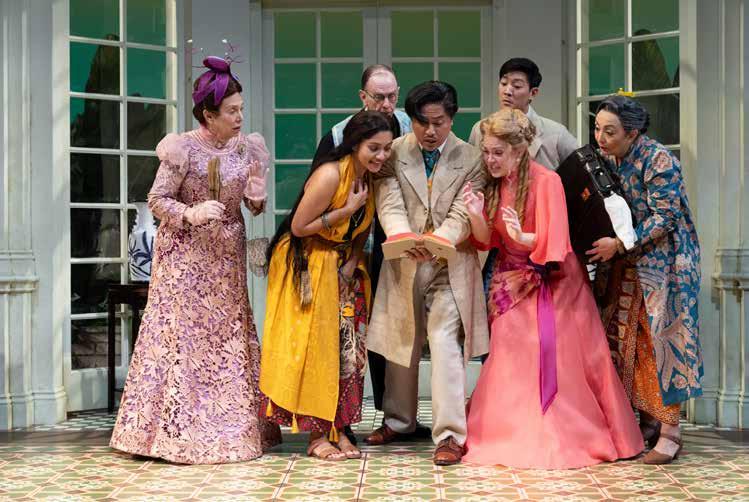
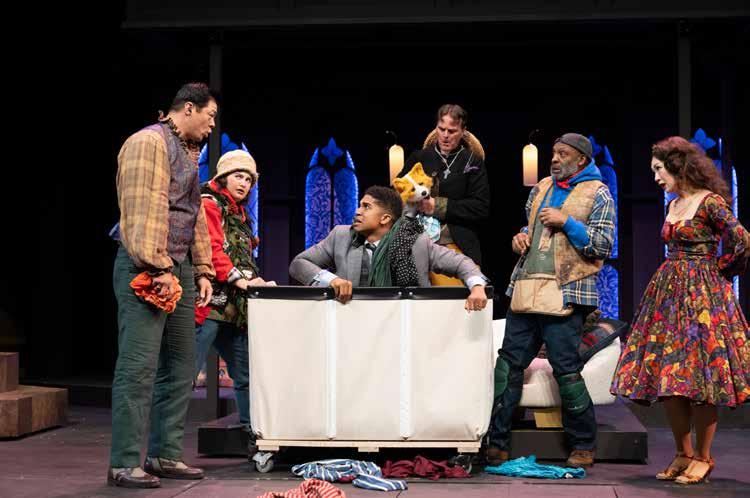
One advantage of the all-woman cast is that it draws attention to the many lines in which women are insulted. Faint praise, I guess.
Coming up next: Quixote Nuevo and Shane Octavio Solis’s Quixote Nuevo is a modern, musical version of the Don Quixote story. The Quixote character is a man with dementia, whose fantasies are presented onstage. Papa Calaca (Father Death) and his band of skeletons try to get Quixote to remember and atone for his failings and thereby be redeemed. Quixote Nuevo opened on July 9 in the Thomas Theatre, under the direction of Lisa Portes. Shane, Karen Zacarias’s Western about

Black cowboys, Mexican farmers, and Indigenous nations in the 19th century, opened on July 31 in the Angus Bowmer Theatre, under the direction of
For more information and to purchase tickets, visit www.osfashland.org.






BY SARA MICHELLE FETTERS SGN STAFF WRITER

The 2025 Vashon Island Film Festival kicks off on Thursday, August 7, with a gala screening of director Noémie Merlant’s The Balconettes, a charming, pitchblack comedy about three women trapped in a Marseille apartment during a heat wave. It’s a delightfully Queer and femaledriven romp that takes several warped turns before its crowd-pleasingly perverse conclusion, and attendees should prepare themselves for a deliciously twisted good time.
The lineup for the four-day festival showcases notable international selections, as well as several local productions, including a free shorts program labeled shortCUTZ , for which tickets are certain to be hard to come by.
I sat down with Mark Mathias Sayre, Vashon Island Film Institute president and founder of the distribution and international sales agency The Forge (specializing in independent films and documentaries from around the globe for the North American market). Here are the edited transcripts of our conversation:
Sara Michelle Fetters: What’s the feeling like right now? I imagine you’re getting pretty excited for opening night.
Mark Mathias Sayre: I am very excited. It always feels a little overwhelming right before, but I can’t wait for August 7. Everyone here at the Vashon Film Institute can’t wait. We’re eager to get things started.
SMF: What are some of the surprises that you have in store for attendees this year?
MMS: I think this is one of the strongest lineups we’ve ever had at the festival. This year, we have a new lead programmer, Stacey Oristano, who is a friend of mine and an actress known for Friday Night Lights, Bunheads, Shameless, and a number of other titles. She’s put together a compelling program this year of notable and awardwinning films. It’s a fantastic assortment of features, documentaries, and shorts.
In addition, we have several fun events scheduled throughout the festival. So many surprises. These include having The Blue Shadows coming up from Los Angeles to play on Friday night, and they’ll have a special guest who is sort of a Seattle legend: Tyler Willman of Green Apple Quick Step.
SMF: One of the great things about the Vashon Island Film Festival is that it’s not just about the cinema but also a celebration of community and culture. How important is it to make sure that remains an integral part of the festival?
MMS: It’s why the festival is called the “Vashon Island Film Festival” and not the
“Vashon International Film Festival.” Certainly, the programming is international, but the island itself is the centerpiece for everything that we do. It’s the thing that makes it extra special. I don’t think almost any other film festival exists in the same sort of setup that we do. The topography, the community, the celebration of the arts here — those are all important parts of what help make this festival so special.
SMF: Post-COVID, it’s been a struggle for festivals to get back on their feet. It seemed like last year’s was bucking that trend, and I imagine your expectation is that will hold for this year’s event. What are your expectations?
MMS: We’ve seen growth both in terms of audience numbers and patrons, but also certainly in regards to enthusiasm and advocacy for it. That naturally happens as we’re able to raise literacy, not only on the island but in the greater Seattle and Tacoma areas as well. This is only possible through routine and consistency, as well as growing the festival at a pace and in a manner that we can control. It’s about putting our heads down and doing what we know we do well as far as programming and special events are concerned. We want to show our visiting filmmakers and audiences as good of a time that we can, and I think our success on that front is shown in attendance and in the continued growth of the festival overall.
SMF: This is an international lineup that features so many high-profile and award-winning films from other festivals like Sundance and Cannes. And yet you still make sure that local filmmakers and features get the opportunity to take center stage. Why is that important, and how proud are you that you get to showcase those films?
MMS: We’re so proud about that here at the Vashon Film Institute that, at the end of the day, I don’t even know if that’s a feeling we can even quantify. The ultimate goal at the institute is to celebrate and support filmmaking in the Pacific Northwest. Certainly this is done by bringing in films that are produced outside of the Pacific Northwest as a celebration of cinema, but it’s equally key that we showcase the art that is produced right here and made by local filmmakers. The sky is really the limit for films made, not just here in Vashon or Seattle but in the Pacific Northwest as a whole, and I think you’re going to see a lot more films being produced in this area.
SMF: As part of that, you once again have a local shorts block that is free to anyone who can snag a ticket. Why do you make sure that this local shorts
block remains a free program?
MMS: It’s the most hyperlocal program that we offer here. shortCUTZ are short films that were shot or produced on Vashon, or about Vashon, or made by filmmakers who do or did reside here. We want to activate as much of the community to show up for those, which they definitely will.
This year, we have a film that local third graders produced here on the island. We have a film that local middle schoolers produced here on the island. We have a short film that a former student of Vashon Island High School, who moved to New York, shot with a group of friends. shortCUTZ is designed to be as much of a communal event as possible, so we can all celebrate these filmmakers and their films together.
SMF: I imagine those third graders and middle schoolers are going to go crazy when they see their film up there
on the big screen.
MMS: That will be one of the more magical moments of the festival. Our youth programming is so important to us here at the institute, spearheaded by Rich Hazzard, our director of strategy and development. This is really the tip of the iceberg of the infrastructure he’s developing, both here on the island and in the Seattle-Tacoma region. I think there’s really no ceiling here as to what these kids can do and what this program can become.
SMF: You’ve left the ticket prices very reasonable again this year, with a fullseries pass costing only $69.99.
MMS: I think, this day and age, it’s more important than ever to keep ticket prices reasonable. While it is important to generate revenue to keep the festival sustainable, it’s also important to me and to the rest of the team that people are able to come and see a wide assortment of international and

award-winning films for an affordable price that they may not get the opportunity to see in a theater otherwise.
SMF: For LGBTQ attendees, whether they are islanders or are visitors, what are some of the highlights of this year’s event?
MMS: I admit that this may be a selfish plug, considering that I am also the distributor of the film here in North America, but that would Noémie Merlant’s The Balconettes, our opening night film. It’s just terrific. It was up for the Queer Palm at the 2024 Cannes Film Festival, and it’s such a glorious feminist and Queer anthem. Top of the list. For sure. Check it out.
SMF: When we talk about festivals like this one, as cineastes, we can’t help but get excited. But the current social and political climate has made showing films like these something of a radical act. How important is it to keep showcasing stories from around the world from so many diverse communities and points of view?
MMS: These films couldn’t be more important than they are right now. These stories, whether they be on film, on the stage, or in a book, or in a painting — it couldn’t be more important for us to support artists and consume art than it is right now. Art really engenders empathy, and to me, empathy really is the kryptonite to prejudice. … This couldn’t be more impor-


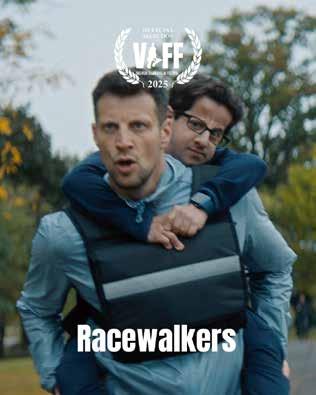
tant than it is today.
SMF: And that makes attending festivals like this almost a form of protest, don’t you think?
MS: 100%. There is active war being waged against art. We need to continue to show our support for art to show that these stories matter, that these voices matter. As proud as I am of the work that we do at The Forge, the work that we are doing here at the Vashon Film Institute is even closer to my heart, probably because it has such a visible and direct impact on the community I not only grew up in but reside in now. It’s been such an incredible gift to contribute back to this community that I owe everything to.

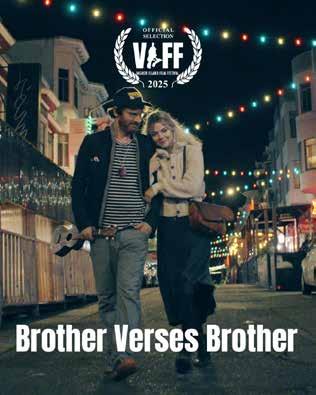

SMF: For attendees, whether they are Vashon residents or visitors to the island, what do you want them to take away from this year’s festival?
MMS: I hope that they are talking about the quality of the programming, the bold and beautiful stories that are being told here, the natural beauty of the island, and the kindness and the hospitality of the community. That’s what I would hope.
The 2025 Vashon Island Film Festival runs August 7–10, with ticket prices set at $10 and an all-access pass going for $69.99. For a full calendar of events and to purchase tickets, head to www.vashonislandfilmfestival.com/tickets.



BY MIRYAM GORDON SPECIAL TO THE SGN

Introducing dancer and kink explorer extraordinaire Anna Urband (aka Hydra), the producer and coordinator of a new monthly cabaret of Black, Queer erotic performers in a unique location downtown. Her company, Carnal Productions (www. carnalproductions.com), focuses on collaborative, sex-positive live shows.
“Capturing the magnitude of style and taste throughout the diaspora,” her PR blurb says, “Carnal Production shows create an immersive experience spanning Afro-punk artistry, queer beauty, hotblooded burlesque glamour, and fetish exploration.”
The venue, the women-owned Karoo Café (karoo.cafe, 1921 First Ave.), is housed in what used to be a mortuary. Its décor and atmosphere are partly what Urband was drawn to create performances in: it is filled with luscious, soft seating and vibrant colors and patterns, and features a high-end cocktail menu and traditional South African food.
Most of the performers generally do not do the “tease” part of burlesque, instead using their chosen costume. Lighting, strobes, and other technical additions create the ambiance they want audiences to take part in.
The show, on the fourth Sunday of each month, starts at 1:30 p.m. Urband would
like to establish it as a Seattle perennial habit — one that people can spread the word about and come back to over and over.
“These shows are choreographed numbers,” she told the SGN. “They come on stage with beautiful costumes with BDSM and fetish themes, so we are in latex and leather. My specialty is wielding floggers. We might use ball gags and cover them in rhinestones. The intention is to highlight an area of sexuality that can also be explored through the fantasy of seeing something displayed on stage.
“I think people who take an interest in what we were doing, as opposed to going to see play, tend to be people who are interested in sexuality and like the theatrical nature of it, so they want to go out, want to dress up to be entertained.”
Urband adds that she cares for her performers. She protects them from being harmed or inappropriately interacted with by patrons. She aspires to pay them equitably. She takes care to be sensitive to consent issues.
Background and a new start
Urband started out as a theater kid and aspired, like many, to have a career in musical theater.
“I was fortunate not to grow up in a particularly repressive household,” she said.

She didn’t get cast very often, though. She felt barriers as a light-skinned, biracial performer.
“The incidences [of racist comments] were constant and overt, like, ‘How is your hair gonna fit into a wig for a costume?’” she said.
She tried to weave together a life as an artist, also taking classes at Velocity Dance Center. She also performed at the Can-Can.
“A dancer-friend from the Can-Can said, ‘Hey, I think I want to do this [burlesque show],’ and I [thought], ‘I can do this,” she said. “I have this whole theater background. I’m a very organized person,’ and I was exploring some of that in my personal life as well.
“In 2018, I cofounded a burlesque cabaret company, and we were producing ongoing, full-blown dance theater productions. We wanted to have a company run by women. In this new company, a huge motivator was making a company that involves sex work with a greater sense of ownership and less infantilization, less objectification for women’s bodies and Queer people’s bodies.”
Urband said that she was not seeing anyone else present the kind of show she was doing. She felt she was offering something on the cutting edge, and she liked that it seemed cool.
“The response from the public was immediate and people were really excited to see something new,” she said.
After a successful few years, during the pandemic, the organization changed and Urband also departed.
About a year ago, Urband was walking near Pike Place Market past Karoo Café. “I walked in, and for the first time [in a while] felt like I have to do a show,” she said. “I felt really invigorated and excited by the space itself. I met the owner, Olivia, and she seemed really excited about the prospect [of performances], and I asked, ‘How do you feel about fetish?’ And she was cool.”
Urband feels strongly that “Black women and Black Trans women are more likely to be murdered from doing sex work and demonized for being sexual, and I think it’s really important to create a space where you can be black and be sexual and it is by choice.”
For more information, go to www.carnalproductions.com/home-3. For more articles and reviews by Miryam, go to https://MiryamsTheaterMusings.blogspot. com

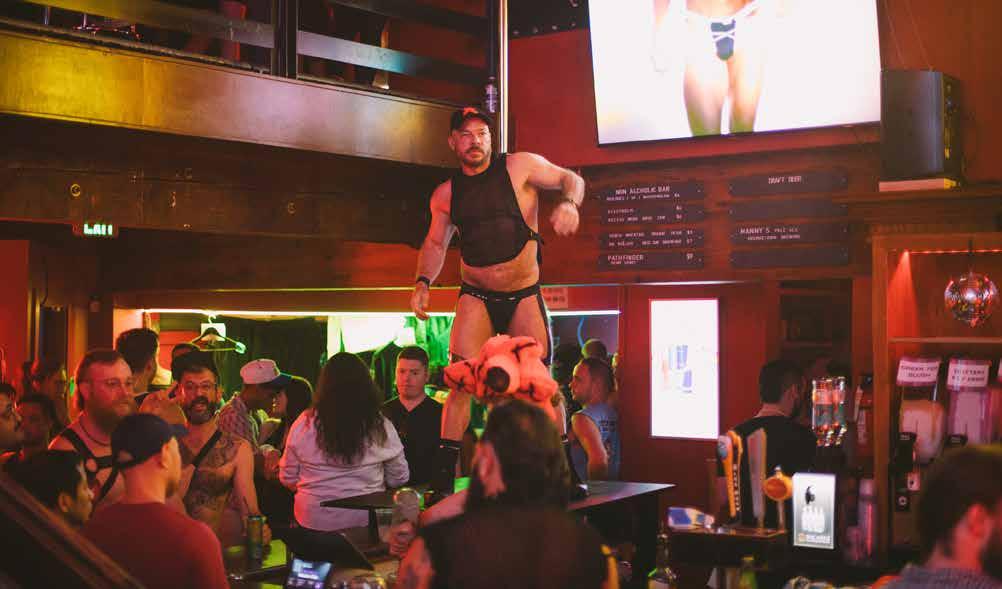
Massive is Seattle’s cutting-edge, Queerowned-and operated nightclub, designed for the Queer community and its allies. Located in the heart of Capitol Hill, this dynamic, three-floor venue offers an unparalleled experience powered by a state-ofthe-art Danley sound system that immerses you in bass that penetrates your body. Our top floor features a mainstage dance floor with the finest equipment atop our customcrafted steel tables, designed by Tyler Morrison to ensure pristine sound quality.
The club, housed in the iconic and historic space that was once R Place, also boasts three bars serving award-winning slushies and high-quality spirits, along with go-go platforms, a stripper pole, and a
second stage on the mezzanine.
Beyond its immersive atmosphere, Massive played a pivotal role in reshaping Washington state’s nightlife. In 2024, we helped lead the charge to pass SB 6105, which decriminalized Queer bodies, provided protection for adult entertainment workers, and removed archaic lewd-conduct regulations and dress codes in clubs. Thanks to our efforts, patrons of Massive experience much more freedom and body autonomy, forever changing the landscape of nightlife and adult entertainment in the state.
Massive is more than just a nightlife destination; it’s a hub for community engagement, offering biweekly movie nights, fig-
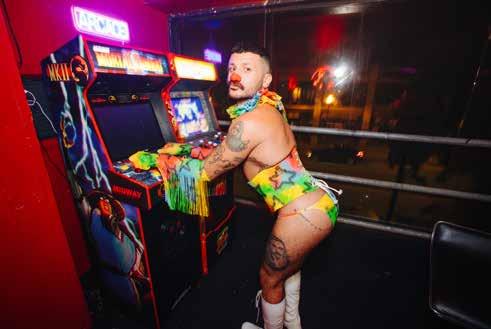

ure drawing sessions, and more.
With resident DJs Nark, Succubass, Sharlese, Luis M, shortSTACK, and yourMOM, Massive is a space created by and for the Queer community, embracing all its vibrant pockets. Massive’s speciality is showcasing a variety of DJs from all over the globe, with talent from London, Tokyo, Mexico City, Berlin, Rio, and Vancouver. Massive is a owned and operated by Kevin Kauer of Bottom Forty/Nark Magazine, Tam Nguyen of Tamarind Tree, and Ethan Cory. Together, they bring vast and varied experience in the nightlife, music, cocktail, and entertainment industries, inspired by visionary experiences from around the world in both the aboveground
and underground scenes.
Check out our August events: “Looking” with Violet Chachki, Twinkie Bash, BLK CHRY, TKVR (Takeover), Butt Blast, Babe Night, and much more. Massive is open Wednesday through Sunday, sporting a variety of music, events, games, and community.
Thank you for beautiful months of dancing and joy.




Queer Mountaineers is an all-volunteerled organization creating joyful, safe, and affirming spaces for LGBTQIA+ people in the outdoors. With chapters across the PNW — in Seattle, Tacoma, Bellingham, and Portland — the group is actively redefining what outdoor recreation looks like and who it’s for.
What started as a small grassroots effort by a group of friends — Queer and Trans climbers, adventure-seekers, artists, and activists — has rapidly become a dynamic and fast-growing movement offering everything from Queer Climb Nights, Queer Run Club, hiking meetups, and mountaineering courses to ski days, social events, Pride celebrations, and more.
At its heart, Queer Mountaineers is about community care, belonging, and breaking
down the barriers that have kept marginalized communities from feeling safe and celebrated in outdoor spaces. The organization is grounded in three key goals: to foster community and safety for people of all backgrounds and identities in nature; to expand access to outdoor recreation through pay-what-you-can meetups and events, gear giveaways, and sliding-scale pricing and scholarships on technical courses; and to train and uplift new leaders in the outdoor and guiding industries.
Queer Mountaineers is committed to keeping its leadership grassroots and community-centered and currently has nearly a hundred active volunteers across the Northwest. The organization’s meetups and events are intentionally designed to meet people where they are, whether that’s

a beginner-friendly city hike or a highly technical summit attempt. Everyone is welcome in the Queer Mountaineers community, no matter their experience level. What sets the group apart is its emphasis on equity, joy, and belonging as central pillars of the outdoor experience. Collaborations with climbing gyms, affinity-focused guiding groups, carefully selected outdoor brands, and nonprofit organizations help create truly inclusive experiences: backpacking trips to Alaska, ice-climbing clinics in Montana, mountaineering courses on Koma Kulshan/Mount Baker tailored specifically for the Queer, Trans, and POC communities, and monthly “Queer Climb Nights” hosted all across the region and beyond.
At a time when Queer visibility can still
come with risk, Queer Mountaineers offers something powerful: a sense of home, freedom, and resilience everywhere and in wild places. Participants describe the events as deeply healing — spaces where chosen family forms on the trail, laughter fills alpine meadows, and everyone is free to be their full selves.
This isn’t just about climbing mountains or bagging peaks. It’s about reshaping culture. Queer Mountaineers is building a movement rooted in joy, access, and love for the land and each other — and it’s doing it with flair, grit, and a whole lot of heart.




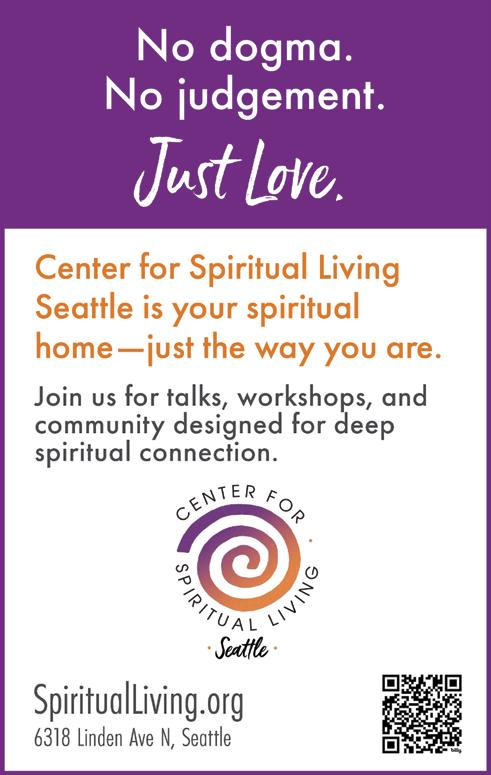



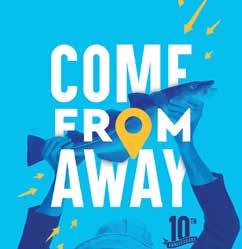





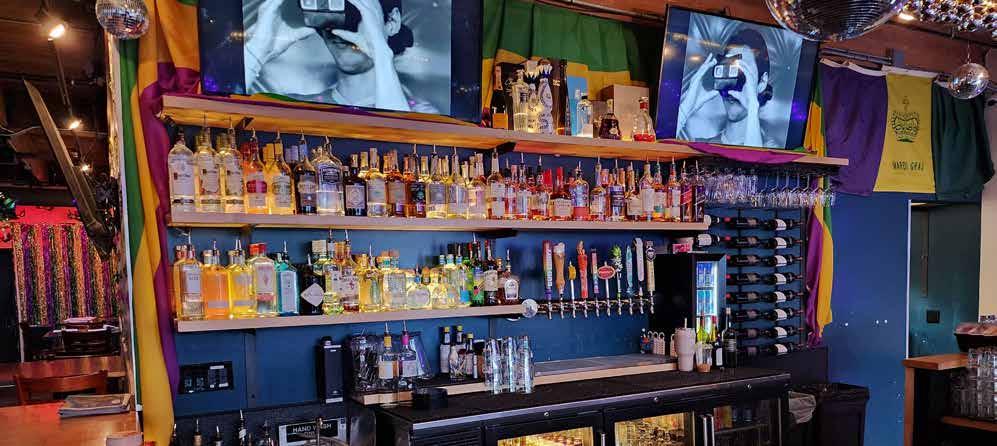
When Union opened in 2018, it was more than just a new addition to Capitol Hill’s bar scene. It was a promise to create space for Seattle’s LGBTQ+ community to gather over a drink, celebrate, and build community. Seven years later, Union has become a landmark, a home base, and a chosen family for many.
As the host of Seattle’s only free 21+ Pride Block Party, Union has cemented its place in the city’s cultural fabric. Pride 2025 was one for the books: Tens of thousands filled the streets to dance, connect, and celebrate Seattle’s vibrant LGBTQ+ spirit. The event has grown into a community staple, reflecting the energy and diversity Union embodies year-round.
But beyond the big weekends, Union is a place you can count on every day of the week. Open until 2 a.m. nightly, Union is
built on a reputation for quality and consistency. You’ll find a welcoming, comeas-you-are atmosphere featuring friendly bartenders, great cocktails, curated music videos, and an expansive layout designed with the community in mind.
Whether you’re catching up with friends under the glow of the patio lights on a Friday night, stopping in for $5 wings on Wednesdays, enjoying $16 bottles of wine during happy hour, or joining us for weekend brunch from noon to 4 p.m., there really is something for everyone (except a cover charge — you’ll never find one of those).
Union is more than just nightlife. It’s a space for connection, celebration, and Queer joy. And no matter the night, the doors are open, the music is on, and the community is here.
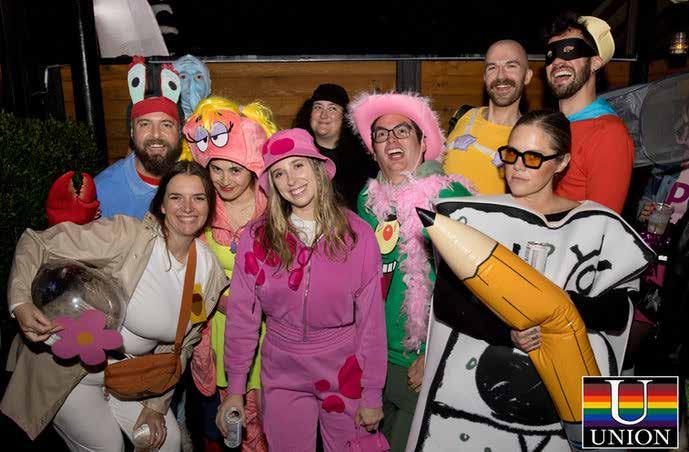
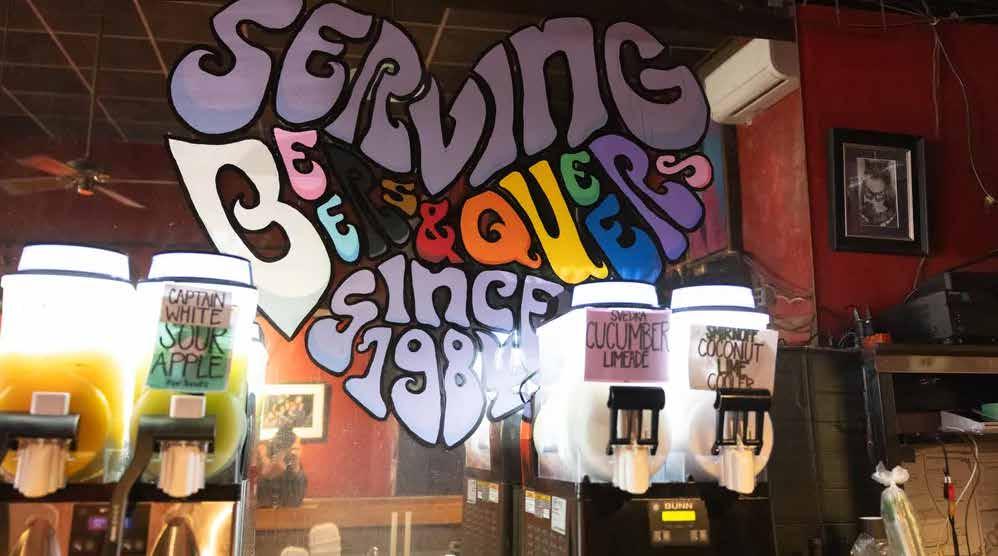
The Wildrose is Seattle’s iconic and only Lesbian bar, proudly serving the LGBTQIA+ community since 1984.
Located in the heart of Capitol Hill, “The Rose” is more than a bar — it’s a cornerstone of Queer nightlife and a welcoming spot to gather, unwind, and celebrate.
Weeknights offer something for everyone, from crowd-favorite trivia and karaoke to drag and burlesque shows and special events that keep things fresh and fun
all week long. On Friday and Saturday nights, the energy turns all the way up, with DJs spinning the hits. The dance floor fills fast, the drinks flow, and the vibe is electric.
Whether you’re a regular or just dropping in, the Wildrose is always ready to show you a good night!
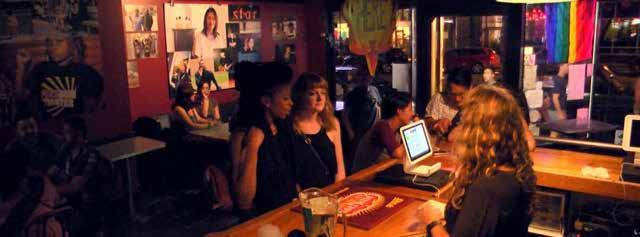
BY PERRIS LARSON

On a street in Cagli, a small town in the Marche province of Italy, I saw a rainbow flag. I was so happy, immediately thinking, “Oh my gosh, they have Pride flags here — that’s amazing!” As I was to be in Cagli for a month on a foreign correspondence program with ieiMedia, I felt relieved, believing that at least the town was affirming.
I immediately got a reality check from my friend and interpreter Ricardo, a Gay man who grew up in Cagli.
“Those, unfortunately, are not Pride flags. The rainbow flag is very much used in Italy to symbolize peace,” he told me. Apparently, if I had looked closer instead of jumping the gun, I would have seen the word “pace” written across the flag — the Italian word for peace, not pride.
I felt disappointed but not surprised. Cagli is religious, with Catholic churches on almost every street and nuns that looked like they walked off the set of The Sound
of Music. I wasn’t expecting a Pride parade. But I did expect a Queer community, no matter how small.
I did find one: four people, to be exact.
One afternoon, Ricardo invited me to hang out with him and his friends Katya, Leonardo, and Gianmarco. I interviewed them on what it is like to be a Queer person in their twenties in Italy.
I thought Cagli, being a small town, would be a difficult place to live, and assumed that heads would turn if someone heard me say I liked women. But according to those who have grown up there, that’s not the case. Compared to other similar small towns, Cagli is incredibly left-leaning.
At least there, not many people in the younger generation care about who they are and who they love. They may get some judgy looks from the older people walking out of church, however, or hear younger
kids say homophobic slurs, not fully understanding what they mean. Ricardo explained that people in Cagli have known each other their whole lives, and no one would be rude to them. Overall, it is safe.
The number of Queer men in Cagli is much larger that of Queer women. Even though there aren’t any Gay clubs or businesses with an actual Pride flag, same-sex relationships have been able to flourish. Gianmarco has been in one for five years. In his words, “In Gay years, that’s like a lifetime.”
Katya, a Bisexual woman, has no intention to leave Cagli. She grew up there, met her girlfriend of four years there, and is able to walk around town holding hands. Doing that might be more common and accepted in bigger towns like Rome and Bologna, but in Cagli, they are also able to be affectionate without being openly judged.
“You know you’re safe here, because it’s all the same people,” Gianmarco said. “But in a bigger city, it can be dangerous, just because there are more people. In some cities, they wouldn’t know what to expect. At least in Cagli, they do.”
When I asked them what they did to connect with other Queers, they all motioned to the backyard and patio table we were seated at. “This is it,” Ricardo said. Getting a group of four to five people together, drinking and chatting in backyards — that’s the Queer scene.
Comparisons with the US Gianmarco, the political science student, had many words to compare Italy and the US when it comes to the LGBTQIA+ community, giving Ricardo a run for his money as translator.
“America has always been more modern in giving people rights,” he explained. “But


the American view on inclusion is more leaning toward segregation.”
According to the group, the difference is that the US still has the separate-but-equal rights format for minorities, whereas in Italy, they just don’t have rights. In Italy, there is no specific penalty for committing a hate crime against a Gay person, and there are no protections. Gay people cannot adopt or have children via surrogacy. They can have civil unions — technically be married — but it is not the same as a straight marriage. (Bigger cities have Pride parades throughout the month of June, though.)
In the US, when a Gay couple marries, they can combine their possessions and put both their names on a house. They have benefits that similar couples in Italy just don’t get.
On a social level, however, Ricardo and his friends believe Italy is more inclusive.
“We all live together — we are included,” they said.
But when it comes to laws and equal rights? Nope. One country is not necessarily better than the other — they just have different ways of handling it.
After the interview ended, I still chatted with the group for another hour. The afternoon heat was close to unbearable, so Gianmarco invited us inside his house for snacks and aperol spritzes. All around the table we shared our stories: our first crushes, the moments when we realized we were Queer, and how we came out to our friends and families.
In a way, it was therapeutic to talk with them. I was going to be in Cagli for a month, missing Pride Month and far from my home and my friends. But finding a Queer community, even a small one, made me feel less alone.

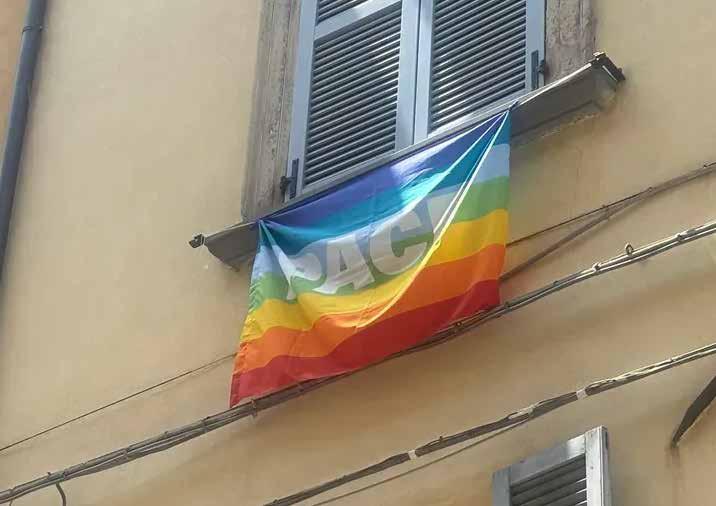
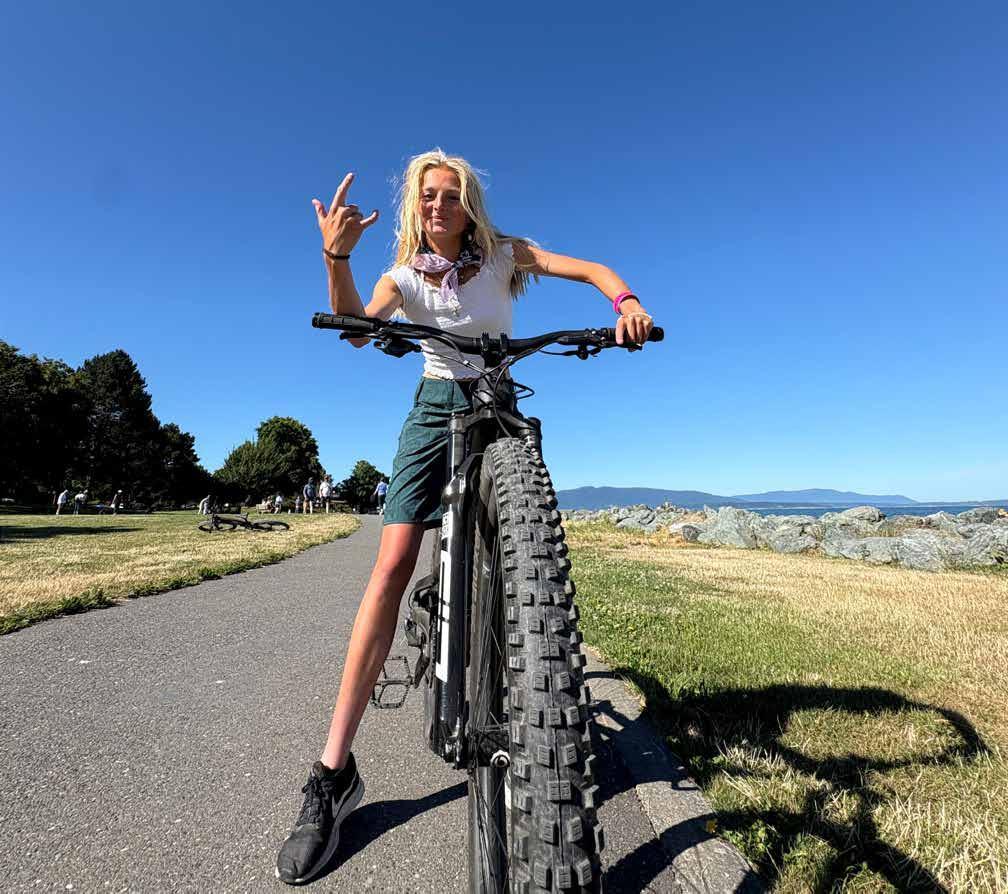
BY NOVA BERGER

Need a getaway? Consider Bellingham. Framed by rugged mountains and sparkling waters, it offers an escape, a chance to slow down and enjoy the simple pleasures of life.
Bellingham is also home to an intriguingly inclusive and curious population. Situated between two of the region’s most Queer-friendly cities, Vancouver and Seattle, Bellingham is a “granola Gay” hub and a safe haven for LGBTQIA+ people in the Northwest: 40-50% of the population of Western Washington University self-identifies as Queer. The city even has its own Pride for the younger generation in June.
“I can walk the streets of Bellingham in drag,” said Betty Pages, the iconic founder of the Bellingham drag scene. “I have for years without fear. And at the very least, in all of the downtown bars, the staff will have your back... There really is no such thing as an unfriendly bar in the downtown area. That is so cool. It really is wonderful.”
Pride weekend
The weekend of July 11 certainly encapsulated that feeling. Bellingham’s pride was on display in an accumulation of color, tunes, and brews.
The main event, “Pride IN Bellingham,” brought thousands downtown for a joyful parade and festival at Depot Market Square. With over 130 vendors, drag performances, and speeches BY community leaders like Selene Etheredge of Trans Survival and author Nova Martin, the festival showcased the richness of Bellingham’s LGBTQIA+ culture.
Miss Pages, as she’s done for years, opened the festival with vibrant celebration of drag culture, featuring high-energy lip-syncing to Queer anthems, engaging
BIKING IN BOULEVARD
humor, and vintage pinup-inspired costumes.
Locally owned businesses like Ragfinery, Off the Top Studio, MW Soapworks, and Rumors Cabaret added flair to the festivities, offering community as much as commerce. Free drag shows, all-ages dances, and open-air joy made the weekend a living, dancing testament to resilience.
There was even a chance to get your snuggle on. Free Mom Hugs, a grassroots organization, literally offered hugs from mothers as a visible reminder that everyone deserves compassion.
Badass energy
But Bellingham isn’t a stranger to badass energy.
Some of the country’s most recognizable female mountain bikers hail from “the City of Subdued Excitement,” such as Olympian and Crankworx champion Jill Kintner, who now lives and rides locally, and her partner Bryn Atkinson, a former World Cup downhill racer. Angi Weston, a nationally recognized coach, leads women’s and youth programs through Radical Roots MTB, helping grow the next generation of riders.
One standout is Matilda “Tilly” Melton, a teenage prodigy who’s already competing alongside top pros. She took part in the Whatcom Mountain Bike Coalition’s iconic program Racing Flying Squirrels, a volunteer-run program that teaches girls to ride from second grade.
“Every single trail there is world-class,” said Adrian Abedon, a mountain biker in Seattle. “Unlike everywhere else, mountain biking is part of the community.”
Why is that? First of all, the city is home to Galbraith Mountain, just 10 minutes


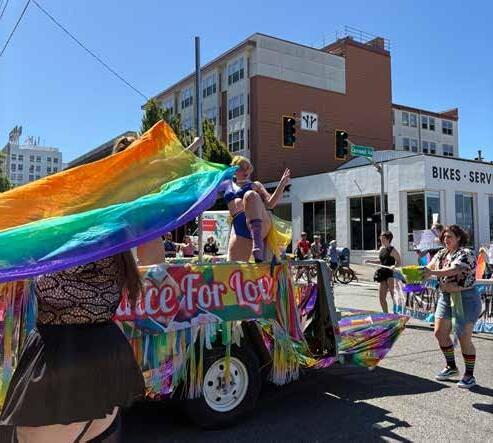

from downtown, where many Bellingham riders learn the craft. There are also many locally owned gear shops that cater to women, like Fanatik and Transition Bikes. Finally, the climate in Bellingham is perfect to support these badass bikers. With mild winters, it’s almost always bike season, and residents embrace that lifestyle.
At the 2025 Northwest Tune-Up Festival, women athletes made a strong showing across multiple disciplines. While official rankings weren’t released for the FMB Freestyle Showdown, top female riders were featured prominently, showcasing their growing presence and talent in the mountain biking scene.
The results reflect trends toward female domination. According to Outdoor Industry Association data, women’s participation in mountain biking grew by over 30% between 2019 and 2023, outpacing growth among male riders.
The weekend also saw some epic art by women. The festival’s Makers Market showcased over 15 local artisans offering handmade goods inspired by the Pacific Northwest’s landscape and culture. A highlight was the live chainsaw carvings by Bellingham artist Leigh Woody, whose forest-inspired sculptures are integrated into the Galbraith Mountain trails.
The Noisy Waters Mural Stage hosted live mural painting by artists such as Seattle’s Stevie Shao and Nora Bruhn from the Bay Area, adding colorful, dynamic art that captured the spirit of Bellingham.
Many vendors featured apparel. One
such brand, Wild Rye, means to empower women and Nonbinary people by focusing on clothes for them. Founded in 2016 by Sun Valley outdoor enthusiast Cassie Abel, its products range from fun-in-the-sun casual wear to garden-inspired hardcore bike gear.
Northwest Tune-Up was also a celebration of inclusive music, with beats and artists from all walks of life. Headliner Brother Ali channeled the emotion of the event. Legally blind, Muslim, and albino, he’s seen his fair share of injustice. Saturday’s show was a reflection of his inner anger, a critique of systematic oppression.
“Welcome to the United Snakes, home of the thief / Land of the slave, grand imperial guard, where the dollar is sacred and power is God.” he sang.
But Ali’s set was also a reminder of hope.
“They say every person is a story full of plot twists / And we are connected like a team, by what our heart gives.”
His lyrics were raw yet humorous, a reminder that sometimes the worst part of life are easier when not taken too seriously . All in all, Bellingham sure is the place to be for biker babes, Gay baddies, rap lovers, or anyone in between. Whether you’re tearing up the mountain trails, dancing in drag downtown, or simply soaking in the vibrant spirit, Bellingham is a place where everyone can find their tribe.
So pack your gear, bring your pride, and get ready to experience the Northwest’s ultimate playground for bold living and fierce belonging, where the goal is always to share the ride with pride!

BY NOVA BERGER
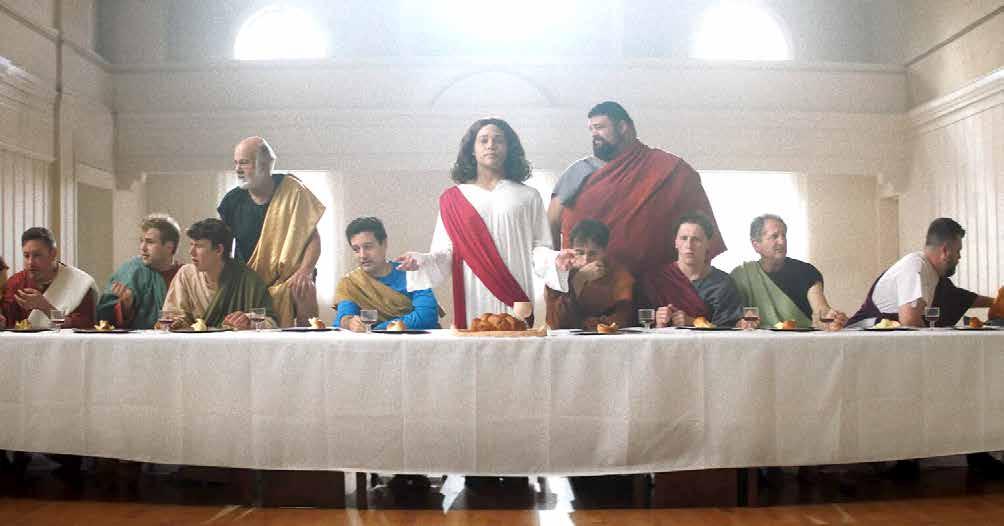
Sit back, relax, and let the leavened bread rise and wine flow as you enjoy Gay Jesus, the latest short film and creative baby of Seattle local Aaron Jin.
This isn’t your typical SIFF indie film though. In a three-part comedy skit series, Jin pokes fun at — and breathes new life into — some of the most iconic moments in the Christian canon: the song of God’s birth, miracles, and resurrection.
His twist? He is far from the straitlaced main character of Christianity’s origin story we all know. He’s a Gay POC, played by Capitol Hill local Chip Sherman.
And unlike other such interpretations, Jin’s work isn’t a radical undermining of the standard story. For him, it’s simply a message to the world that he thinks Jesus could be anyone. Jin’s take is playful, gentle, and refreshingly... joyful. While other works featuring the same idea of a Queer Jesus tend to carry heavy or melodramatic tones, Jin’s work remains campy and lighthearted.
Gay Jesus is about not taking life too seriously, that perhaps as humans, our origin may be far more simple and happy than many religions believe. It’s a message that our fundamentals are ones of unity, inclusivity, and laughter.
“Let people live. Let people love. That’s my sermon.” said Jin.
Timely but lighthearted
In addition to the hilarity of the film, Gay Jesus is timely.
“There is a lot of unfounded fear and legislation being pursued against Trans and
Queer people. My queerness has brought me nothing but love, joy, and so much laughter. So I celebrate my identity through my art,” said Jin.
Each sketch in the series takes a familiar biblical scene and tilts it sideways. But instead of mocking religion, Jin uses humor to open a door. Gay Jesus invites the viewer to imagine what holiness might look like if it were less about fear and more about love — in all its messy, campy and divine forms.
“For me it’s all about the connection to my

audience,” said Jin.
And although the message of Jin’s film is lighthearted, he took its production as seriously as any blockbuster.
“Some of the crew were like, ‘Are you having fun? I feel like you’re not smiling,’” he said.
But for Jin, that’s simply professionalism.
“I’m always having fun, but I take it seriously,” he said.
Filmed on sacred ground
Much of Gay Jesus was filmed on loca-

tion in our very own Capitol Hill neighborhood — not just as a setting but as a spiritual landscape. The bars, the parks, the churches, the streets — it’s all part of Jin’s mythology.
Pop in for a cocktail at the classic Queer watering hole, CC’s. You might just catch a peek of Jesus himself. Jin says he’s a local at the pub.
Irony is far from dead in Gay Jesus as well: the Last Supper was filmed in the All Pilgrims Church, a cornerstone of spirituality on Capitol Hill. The church, constructed in 1906, has become a haven for the LGBTQ+ community, hosting Pride interfaith services and even Queer line dancing on Tuesday nights.
The most radical part of Gay Jesus might not be the concept itself but how it was made. Self-funded through Kickstarter and shot on a shoestring budget, Jin’s project follows the economics of independent film with a twist: he’s not trying to monetize it. He’s trying to give it away.
“Film is one of the only things where you can spend hundreds of thousands or millions of dollars to make something,” Jin said, “but everyone else gets to access it for ten bucks, or free. It’s a gift.”
And that’s what Gay Jesus is: a gift — to the Queer kids growing up in conservative churches, to the adults who are still healing to anyone who needs to be reminded that laughter is sacred, and that love, in all its forms, is worth worshipping.
Amen.



BY AISHA MISBAH
In the cool shade of trees on a hot Seattle summer day, strangers came together to share their love of reading in a safe space.
On July 12, in Volunteer Park, the Queer Silent Book Club hosted “Gays Reading in the Park.” While not very silent, strangers became friends as they chatted about their favorite books and what connected them.
The book club, founded in February by Ronan Leshley and Dani Shull, was established following Donald Trump’s reelection. Shull explained the reason behind it.
“How can we create an environment where happiness and enjoying books [can be fostered] and also be angry and scared?... So many things are under threat right now. Bills are being passed that are threatening so many aspects of life.”
The event, Leshley explained, is intended

to serve as a safe space where people can reset and regain some energy for the coming week. While it’s a Queer book club, no identities will be checked, so anyone is welcome to join.
Everyone brought the books they are currently reading. Shull is listening to the audiobook Necrobane, the second in the Sapphic Warden series by Daniel M. Ford, which follows a female necromancer in a small village that seemingly holds powerful secrets; she must use her magic to save the world from evil.
Leshley is reading Fable for the End of the World by Ava Reid, a Sapphic Hunger Games-esque book about a twisted game in which the indebted are hunted to death.
Two fates of two girls, one hunter and one hunted, become intertwined as they slowly
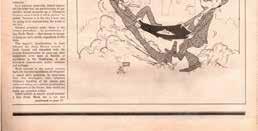
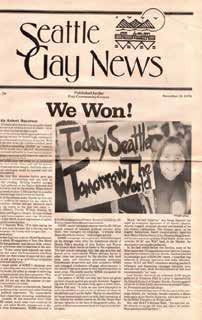


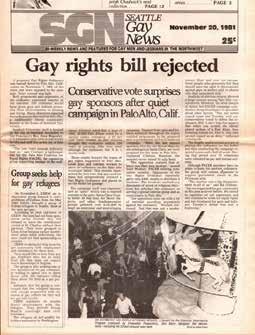

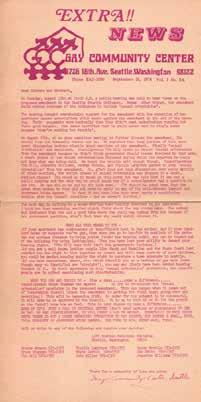
fall in love against all odds.
For Tara Rayres, a freelance book editor, it was their first time attending a Queer Silent Book Club event, having heard about it through a friend.
“I think the Queer-specific part of it was like a big thing for me,” Rayres said. “I feel safer and more at home. People are not going to inaccurately perceive me or have frustrating situations [occur].”
Rayres brought along the book they are currently reading, Yellowface by R.F. Kuang, which follows a white woman who steals the work of her dead rival, a Chinese woman who dies in her prime. She rebrands herself with an ethnically ambiguous name and author photo and becomes a rising success.
Rayres found this book appealing,

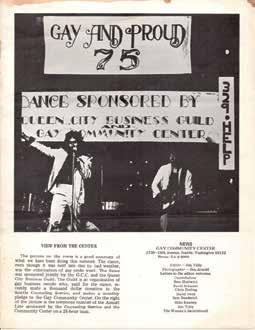
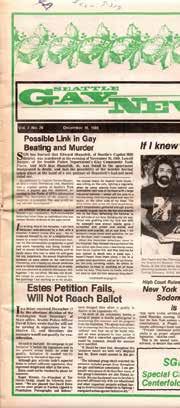
because, working in the publishing world, they are interested in the way people of color have been or haven’t been allowed in editing spaces.
“I love connecting through books and literature in Queer spaces,” Rayres said. “I’m from Louisiana, and it has its strengths and flaws, but people talk and engage more with each other [there]. It’s kind of been a journey finding community in [Seattle], and I feel this space is super welcoming.”
The Queer Silent Book Club meets every first Monday of the month at Ada’s Technical Books and Café (425 15th Ave. E.) and every fourth Friday of the month at Charlie’s Queer Books (465 N. 36th St.).

